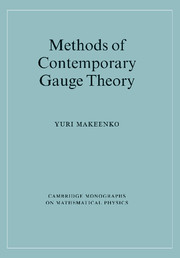16 - Noncommutative gauge theories
Published online by Cambridge University Press: 02 December 2009
Summary
We have seen in the previous chapter that the twisted reduced models reproduce planar graphs of the d-dimensional quantum field theories as N → ∞. However, the twisted reduced models make sense order by order in 1/N2. For the continuum twisted reduced models, the topological expansion goes in the parameter det (Bµν).
At finite Bµν, the twisted reduced models are mapped [CDS98, AII00] into quantum field theories on noncommutative space characterized by a (dimensional) parameter of noncommutativity. The noncommutative gauge field is no longer matrix-valued as in Yang–Mills theory but noncommutativity of matrices in the reduced models is transformed into noncommutativity of coordinates in the noncommutative gauge theory. The planar limit of ordinary Yang–Mills theory is reproduced at large noncommutativity parameter θµν → ∞, while ordinary quantum electrodynamics is reproduced as θµν → 0.
Noncommutative gauge theories possess a number of remarkable properties. The noncommutative extension of Maxwell's theory is interacting and asymptotically free. The group of noncommutative gauge symmetry is very large and incorporates space-time symmetries, in particular, translation, Lorentz transformation, parity reflection. This restricts a set of observables in noncommutative gauge theory which are built out of both closed and open Wilson loops. At rational values of a (dimensionless) noncommutativity parameter, noncommutative gauge theories on a torus are equivalent to ordinary Yang–Mills theories on a smaller torus with twisted boundary conditions representing the 't Hooft flux.
- Type
- Chapter
- Information
- Methods of Contemporary Gauge Theory , pp. 377 - 404Publisher: Cambridge University PressPrint publication year: 2002



